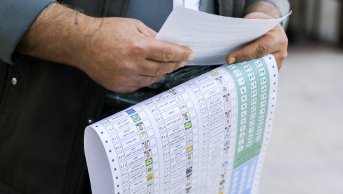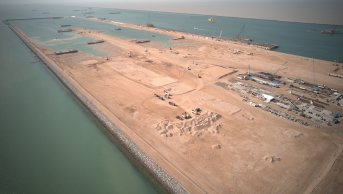Iraqi Parliamentary Elections in Kirkuk: Light of Field Observations

As ORSAM team, we had the opportunity to stay in Kirkuk and observe the parliamentary elections held in Iraq on 12 May 2018 Iraq there. There are approximately 950 thousand voters in Kirkuk. Slightly more than half of the voters were able to obtain their voter cards. Despite this, the rate of participation in the elections was lower than this. 25 lists and 278 candidates ran for the elections in Kirkuk. The elections were held between 07:00 and 08:00 a.m. for polling clerks. Voters went to polls between 08:00 and 18:00 in general. Although a propaganda ban was declared before the elections, banners and pennants were left in front of several schools which were used as polling centers. Banners were pulled off two hours before the elections ended.
Having been used for the first time in Iraq, electronic identification devices and electronic ballot boxes were brought from South Korea. It was thought that this system would not be favorable due to lack of infrastructure in Iraq. Indeed, this situation made itself felt with the voting process. Besides, a device for identification and a method which matches the voter with the authentic data matrix on the ballot paper were used in the elections. Therefore, competent authorities had the opportunity to determine which voter polled for which list and candidate. This new practice causes fear that people might be blacklisted with the votes they cast. Moreover, there are reservations that the government that will be newly formed might lead to the emergence of political opposition by such means. It is also possible to say that a general conviction has formed indicating that an intervention was made to the elections through SD Ram and memory cards on the electronic identification devices and electronic ballot boxes. Especially the results in Kirkuk are a sign of this. Indeed, Turkmens in Kirkuk have already taken to the streets due to the troubles in the voting process and suspicions about the polling results although the election results were not officially announced.
As observing team, we also witnessed clearly that the voting did not take place healthily since almost all the electronic voting devices were out of order in the election centers we visited in Korya Neighborhood where there is a dense Turkmen population. Indeed, it was not possible to vote until 11:00-12:00 at certain election centers. That is why it is said that a number of voters turned back without voting and did not go back to polls. Despite this, it was seen that the rate of participation of Turkmens was higher than the previous elections in Kirkuk. As a standardized practice, information forms showing how many people voted were obtained from all electronic identification devices at 12:00. According to the figures received in the middle of the elections, it was announced that the rate of participation in the regions where Turkmens live was much higher than the other regions. Following this, the information forms given by the electronic identification devices at 18:00 when the elections ended, indicated that the participation was generally around 50 percent in Kirkuk.
It is said that the devices used in the elections were checked one day before the elections in the regions where Kurds constitute the majority of the population. It was seen that there were not serious problems at the election centers we visited, which confirms this situation. The polling clerks stated that Iraqi Independent High Electoral Commission (IHEC) intervened with slowly functioning or broken devices in a short while. There was no queue of voters waiting to vote in these regions since the rate of participation was low when compared to other regions. Indeed, the rate of voters who went to polls in the neighborhoods where there is dense Kurdish population such as Rahimawa, Shorja, Shoraw, Iskan was around 20 percent as the clock approached midday. When compared to the 2014 elections in the mentioned regions, this situation is the exact opposite.
It is said that there are more than 400 thousand internally displaced people who have the right to vote across Iraq. Special election centers were established to enable these voters to go to polls in the provinces in which they are registered. 11 polling centers were opened for these voters in Kirkuk province. However, there was a severe chaos at the election centers where migrants voted since a list was not prepared with regard to the polling centers and ballot boxes by which migrants were going to vote. Many migrant voters could not vote since they could not find the center at which they were going to poll. It was seen that the centers visited were crowded since the devices were functioning slowly. It is possible to say that this situation faced by migrants caused the rate of participation to remain at 15-20 percent.
On the other hand, no serious security problem was faced at the city center of Kirkuk in the voting process. The federal forces under the Iraqi central government took necessary measures to ensure the security of the elections in Kirkuk. Iraqi Special Operations Forces (SWAT) and local police forces intensely provided the security of election centers in Kirkuk. However, it was seen that SWAT forces undertook the general responsibility since the local police in Kirkuk asked for the permission of SWAT forces so that observers could enter the election centers. Even an observation mission was prevented by SWAT forces from entering a school in Kirkuk. On the other hand, 8 security forces from the federal police and al-Hashd al-Shaabi were killed as a result of a landmine explosion in Maktab Khalid in the east of Kirkuk on the election day. Furthermore, 6 security forces lost their life in an attack carried out with a bomb-loaded vehicle in al-Kan district. However, these acts of violence did not affect the overall voting process since they occurred in the districts relatively away from the city center.
Furthermore, Turkmens took to the streets requesting that the votes should be counted manually in Daquq, Lailan, Altun Kupri on the ground that the elections were rigged following the first results of the elections and some Turkmen groups went on a hunger strike. The protests also increasingly continued each hour in front of the IHEC building. Turkmen officials went to Baghdad to resolve the process about the election results in Kirkuk. The IHEC also sent a delegation to observe the ballot boxes. However, Turkmens seem insistent on having what they deserve since the election results that will be approved in Kirkuk might both constitute a reference to the following elections and will be important in the determination of Kirkuk’s future.









